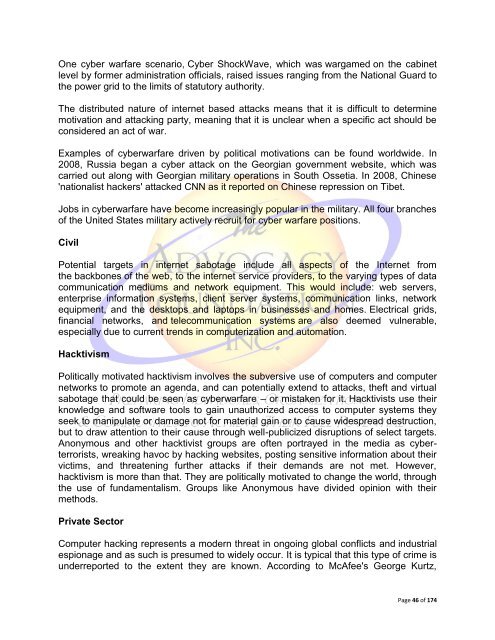International Cyber Terrorism
International Cyber Terrorism
International Cyber Terrorism
- No tags were found...
Create successful ePaper yourself
Turn your PDF publications into a flip-book with our unique Google optimized e-Paper software.
One cyber warfare scenario, <strong>Cyber</strong> ShockWave, which was wargamed on the cabinet<br />
level by former administration officials, raised issues ranging from the National Guard to<br />
the power grid to the limits of statutory authority.<br />
The distributed nature of internet based attacks means that it is difficult to determine<br />
motivation and attacking party, meaning that it is unclear when a specific act should be<br />
considered an act of war.<br />
Examples of cyberwarfare driven by political motivations can be found worldwide. In<br />
2008, Russia began a cyber attack on the Georgian government website, which was<br />
carried out along with Georgian military operations in South Ossetia. In 2008, Chinese<br />
'nationalist hackers' attacked CNN as it reported on Chinese repression on Tibet.<br />
Jobs in cyberwarfare have become increasingly popular in the military. All four branches<br />
of the United States military actively recruit for cyber warfare positions.<br />
Civil<br />
Potential targets in internet sabotage include all aspects of the Internet from<br />
the backbones of the web, to the internet service providers, to the varying types of data<br />
communication mediums and network equipment. This would include: web servers,<br />
enterprise information systems, client server systems, communication links, network<br />
equipment, and the desktops and laptops in businesses and homes. Electrical grids,<br />
financial networks, and telecommunication systems are also deemed vulnerable,<br />
especially due to current trends in computerization and automation.<br />
Hacktivism<br />
Politically motivated hacktivism involves the subversive use of computers and computer<br />
networks to promote an agenda, and can potentially extend to attacks, theft and virtual<br />
sabotage that could be seen as cyberwarfare – or mistaken for it. Hacktivists use their<br />
knowledge and software tools to gain unauthorized access to computer systems they<br />
seek to manipulate or damage not for material gain or to cause widespread destruction,<br />
but to draw attention to their cause through well-publicized disruptions of select targets.<br />
Anonymous and other hacktivist groups are often portrayed in the media as cyberterrorists,<br />
wreaking havoc by hacking websites, posting sensitive information about their<br />
victims, and threatening further attacks if their demands are not met. However,<br />
hacktivism is more than that. They are politically motivated to change the world, through<br />
the use of fundamentalism. Groups like Anonymous have divided opinion with their<br />
methods.<br />
Private Sector<br />
Computer hacking represents a modern threat in ongoing global conflicts and industrial<br />
espionage and as such is presumed to widely occur. It is typical that this type of crime is<br />
underreported to the extent they are known. According to McAfee's George Kurtz,<br />
Page 46 of 174
















